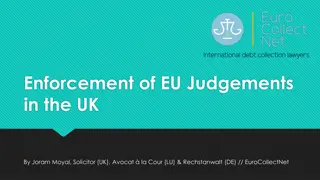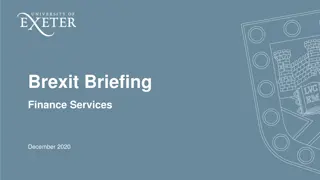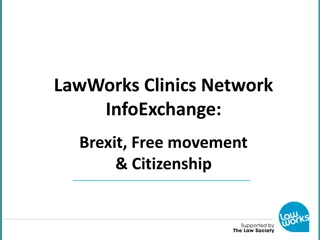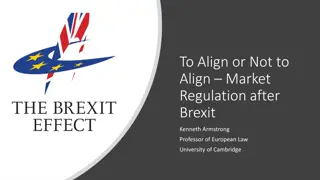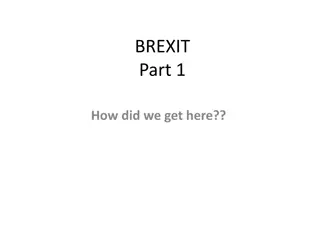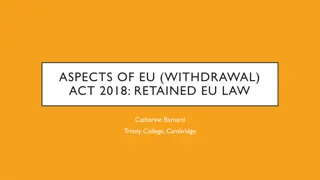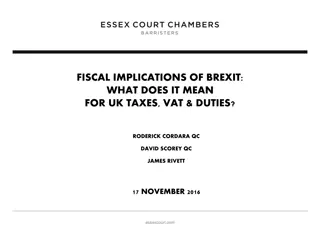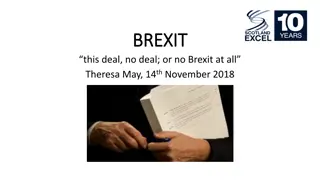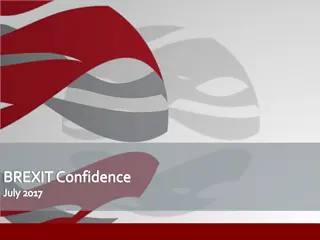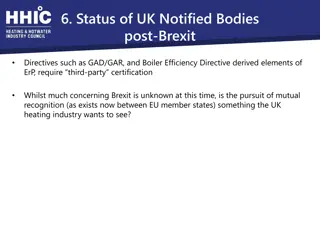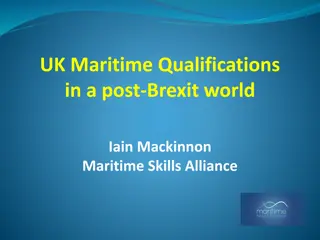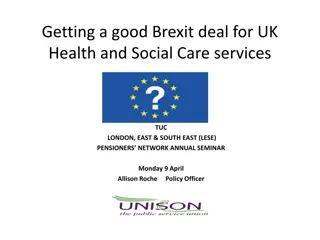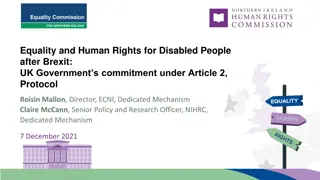
Brexit Financial Services Impact Insights
Gain valuable insights into the potential impact of Brexit on financial services, including crucial questions, European international agreements, EU relationship options, the Brexit exit process, and more. Presented by Chris Anderson at the Staple Inn Actuarial Society.
Download Presentation

Please find below an Image/Link to download the presentation.
The content on the website is provided AS IS for your information and personal use only. It may not be sold, licensed, or shared on other websites without obtaining consent from the author. If you encounter any issues during the download, it is possible that the publisher has removed the file from their server.
You are allowed to download the files provided on this website for personal or commercial use, subject to the condition that they are used lawfully. All files are the property of their respective owners.
The content on the website is provided AS IS for your information and personal use only. It may not be sold, licensed, or shared on other websites without obtaining consent from the author.
E N D
Presentation Transcript
Brexit Financial Services Impact Staple Inn Actuarial Society 27 March 2017 Chris Anderson
Disclaimer The views expressed in this presentation are those of the author, Chris Anderson, and not necessarily of the Staple Inn Actuarial Society or EY Page 2
Financial Services Questions Will we be able to continue to sell across the EU? What options if we can t? What changes may be required to our corporate structure? What restrictions will be placed on my EU staff and clients? (not just immigration) What changes will be made to the regulatory environment? Will this affect my existing business contracts? Page 3
European International Agreements UK Special Treatment Zone??? Page 4
EU Relationship Options (off the shelf) Influence Trade Other rights and obligations Free move- ment of people Contri- bution to EU budget Single market access Agree own trade deals Votes on EU Law Schengen membership Euro Standard EU membership UK membership of the EU EEA Norway Bilateral agreements Customs Union Free Trade Agreement WTO membership Swiss Model Turkey Canada Source: EY Analysis Page 5
Brexit How will the UK exit? Process Negotiated withdrawal under Article 50 of the Treaty of Lisbon Article 50 1. Any MS may decide to withdraw from the Union 2. A MS which decides to withdraw shall notify the European Council of its intention. the Union shall negotiate and conclude an agreement with that State, setting out the arrangements for its withdrawal, taking account of the framework for its future relationship with the Union. It shall be concluded on behalf of the Union by the Council, acting by a qualified majority, after obtaining the consent of the European Parliament. Notice on 29 March 2017 Great Repeal Bill Repeal of EC Act 1972 Incorporate EU law into UK law 3. The Treaties shall cease to apply to the State in question from the date of entry into force of the withdrawal agreement or, failing that, two years after the notification referred to in paragraph 2, unless the European Council, in agreement with the MS concerned, unanimously decides to extend this period. More legislation required in the UK (up to 15 bills?) European Parliament and UK Parliament will ratify final agreement, as will EU Council (both by majority) Constitutional questions 4. For the purposes of paragraphs 2 and 3, the member of the European Council or of the Council representing the withdrawing MS shall not participate in the discussions of the European Council or Council or in decisions concerning it. 5. If a State which has withdrawn from the Union asks to rejoin, its request shall be subject to the procedure referred to in Article 49. Devolved assemblies: consent vs consultations Does the exit agreement cover UK arrangements with EU post Brexit? Page 6
What do we know? Brexit Plan Point 2 5 8 Text Control of our own laws Control of immigration Free trade with European markets New trade agreements with other countries A smooth, orderly Brexit Implications Leaving the single market Leaving the single market As free as possible? 9 Leaving the customs union 12 Transitional arrangements? Page 7
Why should we get a good deal? 5th largest GDP in the world World s 10th largest exporter and 5th largest importer UK largest trade partner for EU (17% - very similar to US) 44% of UK exports ( 220bn) go to the EU Mutually beneficial to continue tariff-free trade UK military force, intelligence services and nuclear deterrant important (given Trump status on NATO) London is the dominant Euro clearing centre Nearly 50% of all Euro FX clearing activity (1.0trn EUR / day) Nearly 70% of all Euro derivative clearing activity (0.9trn / day) Disaggregation of Euro clearing from London would cost FS firms $77bn Page 8
Why wont the EU care? EU leaders don t want to encourage Eurosceptics in other EU countries Germany and France have elections to worry about Several countries care much more about free movement than they do about free trade Some see an opportunity to exclude London from financial services and grow EU centres Page 9
A sector by sector approach. Page 10
How important is FS to UK and EU? To the UK 7% of UK GDP UK s biggest export industry - $71bn trade surplus in 2013 Contributes 12% of total UK income tax and 15% of corp tax 1.1 million employees (two thirds outside London) 40bn- 50bn annual revenues linked to the EU (20-25%) To the EU London ranked world s leading financial centre by GFCI (European cities are far behind) London responsible for +70% of Euro clearing activity in Europe. London responsible for 35% of wholesale finance activity. Page 11
Passporting Current system The ability of an authorised EU financial services firm to sell its services to any other EU country without further authorisation, either by: Selling directly cross-border (e.g. UK firm sells directly to France) Setting up a branch, as opposed to a subsidiary (e.g. UK firm sets up a branch in France to sell business in France) Passporting applies at the activity level, not company. 5,476 UK firms using passporting, 8,008 EU to UK Page 12
Benefits of Passporting No need to set up subsidiaries: Increases diversification benefits to tax, capital and liquidity Lower overheads No need for multiple regulatory authorisations No separate public / regulatory reporting Allows firms to offer the full suite of services to clients (unclear of the impact if this became fragmented) Page 13
Equivalence (second best to Passporting) Where the EU agrees that a non-EEA country s regulatory framework is sufficiently similar to the equivalent EU framework, that the country is allowed to sell its services to EEA countries. However, not available for: Lending / deposit taking Payment systems UCITS Retail asset management Insurance (only reinsurance) More vulnerable status than passporting. Also more time consuming to initially set up. Great Repeal Bill should ensure day 1 equivalence. Page 14
Example If a German company was trying to raise 500 million for an investment to build a factory, it might do so by raising a bond with, in addition, a syndicated loan, and then hedge that [with derivatives]. Those are three different products. The company would come to London for that. All of that is based on passporting rights. If passporting rights were lost, the company would not be able to come to London for bonds, for a syndicated debt or for hedging foreign exchange or interest rate risk. If we got equivalence, under MiFID and EMIR, it might be able to come for the bond and to get some hedging, under EMIR, but it would not be able to get the syndicated debt, because there is no provision for lending under any of the existing regulations. So banks based in London would only be able to provide a narrower range of services. Anthony Browne Head of the British Bankers Association Page 15
What does WTO mean for FS? General Agreement on Trade in Services WTO members must ensure treatment of services and suppliers from other members no less favourable than that accorded to like services and suppliers of any other country Four modes of supply Cross border supply typically limited commitment Consumption abroad typically limited commitment Establishment Presence of natural persons Page 16
Options for UK Firms with EU business Existing Business (either cross-border or branch) Carry on as normal (if grandfathering is allowed) Sell business to another firm Part VII business into a new subsidiary New Business Set up subsidiary in EU Move HQ to EU (and close UK operations?) Acquire EU firm Close to new business All of these things take time, firms should currently be thinking about no regrets actions. Page 17
Case Study UK firm with EU branch 2017 2018 2019 Q1 Q2 Q3 Q4 Q1 Q2 Q3 Q4 Q1 Anticipated Brexit timeline Article 50 triggered UK to exit EU Option A: Establish EU subsidiary with authorised branch for new business, run-off existing business Prepare for authorisation of EU NewCo Authorisation process New Company established Assuming passporting lost Option B: Establish EU subsidiary, transfer existing branch business through a Part VII transfer Prepare for authorisation of EU NewCo New Company established Court Directions hearing Authorisation process Final court hearing Part VII effective 1st Jan 2019 Prepare documentation and build plan for Part VII transfer P holder comms Tax clearance Page 18
Best outcomes Best outcome (for UK and Europe) is a bespoke passporting / equivalence deal for the UK (in the form of a bilateral agreement) which would cover all of financial services. This would have to involve some form of independent arbitration arrangement as opposed to ECJ (could be wrapped up in wider FTA) UK will want to get this agreed early in Article 50 negotiations, given the timeline for firms to make changes Failure to do this will see UK firms have to establish subsidiaries (expensive) or move HQ / operations depending on outcome Almost all options will require a transitional agreement Page 19
Other Issues Tax Setting up of subsidiaries may have large tax implications, both for policyholder tax as well as corporation tax Data Many companies store their data centrally, sometimes not in the UK. The agreements and implications for data requirements being changed require investigation. Page 20
Market Activity Operations Moves Bank of China and Sumitomo in advanced talks with Irish regulator (CBI) to move some London operations Barclays plans to move 150 senior roles to Dublin (total employees 10,000). Global HQ still London. HSBC will move 1,000 trading staff from London to Paris in 2019. Global HQ still in London. German regulator (Bafin) calling meeting with 20+ banks to discuss moving operations to Frankfurt Santander commits to no relocation of UK employees Bank of Singapore will set up centre in London Page 21
Market Activity Structure / Strategy Change Lloyds of London aims to set up Malta subsidiary to continue to sell business across the EU US private equity firms Blackstone and Carlyle look to set up units in Luxembourg to retain passporting Lloyds Banking Group may set up subsidiary (branch conversion) in Germany or the Netherlands in the event of UK losing single market access Page 22
Market Activity IPO Activity London Stock Exchange falls to 3rd by IPO value (first time since 2009 it isn t 1st) Small private equity deals (< 100m) seem relatively unaffected (42 in H1 2016, 40 in H2) UK M&A activity resilient, in line with 5 year trend ( 144.5bn). However, foreign buyers share increased markedly. Page 23
Questions Page 24



